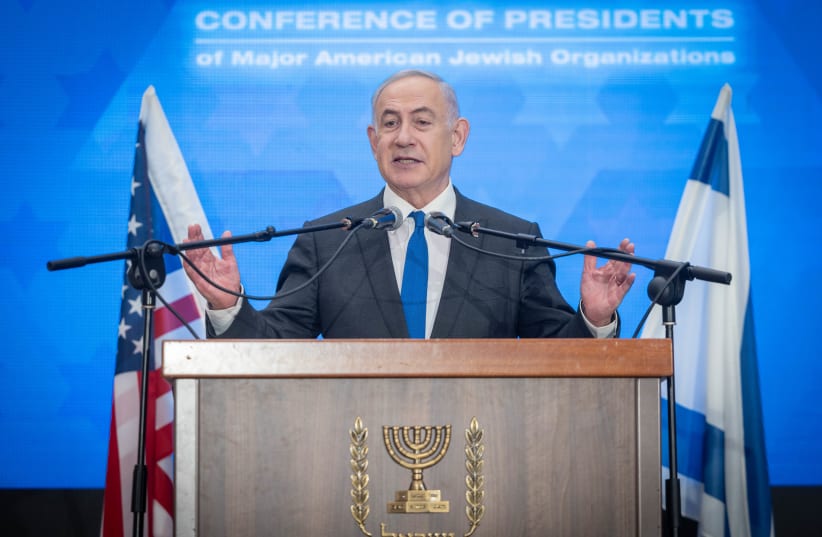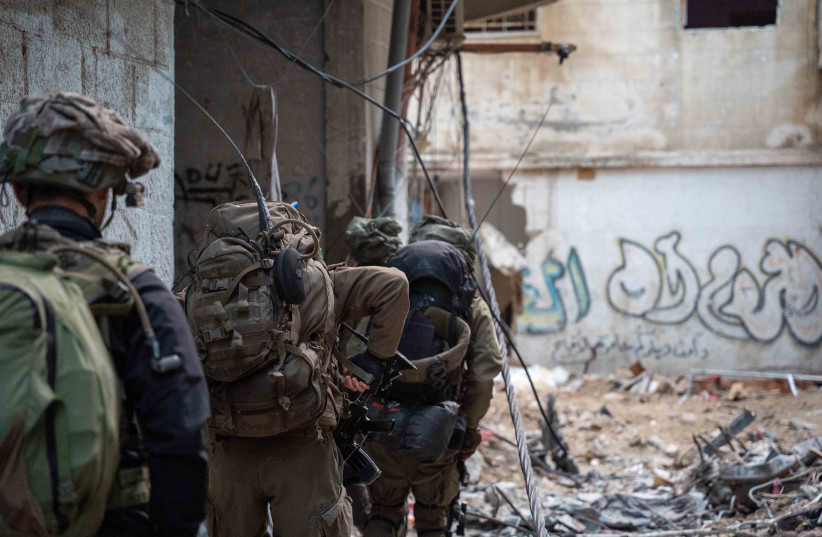by Tovah Lazaroff
Document calls for local Palestinian governance in the enclave and IDF security control there and over all the territory west of the Jordan River.
 |
The Israeli army will retain securing control of the Gaza Strip and the West Bank once the war is over, and a local Palestinian governance of technocrats will rule the enclave, according to a plan Prime Minister Benjamin Netanyahu presented to the security cabinet and which was released to the media early Friday morning.
“It was distributed to the security cabinet members as the basis for discussion on the subject,” the Prime Minister’s Office said.
The brief document, which dealt only with principled points and was short on concrete details, divided the situation into three periods: immediate, short, and long-term.
In the short term, the plan underscored Netanyahu’s principled position that Israel was determined to continue the war, which began on October 7, until it had destroyed the terror group Hamas, which has forcibly ruled Gaza since 2007.


“The IDF will continue the war until its goals are achieved: the destruction of Hamas and the Islamic Jihad’s military capabilities and governmental infrastructure, the return of the hostages, and the prevention of any threats emanating from the Gaza Strip.”
Netanyahu restated this goal, as an Israeli delegation was scheduled to head to Paris for talks for the release of the remaining 134 hostages.
Among the points of contention between Israel and Hamas has been the terror group’s insistence on a permanent ceasefire and the complete IDF withdrawal from Gaza.
In setting out his short and intermediate goals for Gaza, Netanyahu clarified that this would not happen.
He also didn’t set a timeframe for his intermediate plan, which looked at the security and civilian aspects of life in Gaza after the war.
The Israeli army will “maintain operational freedom of action in the entire Gaza Strip, without a time limit, to prevent the renewal of terrorism and to thwart threats from Gaza,” according to Netanyahu’s plan.Gaza to be completely demilitarized in plan
Israel will have “security control over the entire area west of [the] Jordan [River], including the Gaza border area, to prevent the strengthening of terrorist elements in the Palestinian Authority and the Gaza Strip and to thwart threats [emanating from there] against Israel,” the plan stated.
In addition, according to the plan, “the Gaza Strip will be completely demilitarized.” The plan alluded to a second domestic security force, akin to the police, that would maintain law and order.
It appeared to indicate a model that now exists in the West Bank, where there is a Palestinian police force, while the IDF maintains overall security control.
According to the plan, the only arms allowed in Gaza will be “what is required for maintaining public order.”
Israel will be tasked with the “responsibility for realizing this goal and overseeing its maintenance in the foreseeable future,” the plan stated.
It pushed back at the US objection to a buffer zone by the Gaza border with Israel. It noted that “the security [buffer] zone established in the Gaza Strip in the area bordering Israel will exist as long as there is a security need for it.”
The document does not mention the buffer zone by Gaza’s border with Egypt, known as the Philadelphi Corridor, through which Hamas has in the past smuggled weapons into the enclave. Egypt has warned against Israeli control of that zone.
The plan spoke instead of a “southern closure” system along Egypt’s border with Gaza, to prevent terror groups from rearming themselves. It will operate “as much as possible in cooperation with Egypt and with US assistance.”
That closure system will be “based on measures necessary to prevent smuggling from Egypt both under and above ground, including at the Rafah crossing” into Gaza from Egypt, according to the plan.
Netanyahu in his Day After document outlined civilian plans for Gaza in the intermediate period. Gaza governance, which had been in the hands of Hamas, will now be controlled by local Palestinians with administrative experience who are not identified with any country or entity that supports terrorism and receives payments from terrorists.
It’s a description that would make it impossible for the Palestinian Authority in its current form to operate in Gaza, given that it provides monthly stipends to Palestinian terrorists jailed by Israel and their families. It also could eliminate the Day After involvement of Arab countries with connections to Hamas, such as Qatar, which is now helping to mediate a hostage deal.
Netanyahu in his plan, spoke of the promotion of “a comprehensive de-radicalization program for all religious, educational and welfare institutions in the Gaza Strip.” This the plan said, would be done “as much as possible with the involvement and assistance of Arab countries that have experience in promoting de-radicalization in their territory.”
The prime minister pledged that “Israel will work to shut down the United Nations Relief and Works Agency, whose operatives were involved in the October 7 massacre, and whose schools taught terrorism and the destruction of Israel.”
UNRWA has been the premier relief organization for Palestinian refugees, servicing 5.9 million people in Syria, Lebanon, Jordan, Gaza, the West Bank, and east Jerusalem.
Israel, however, has found that a small number of UNRWA employees were involved in the Hamas-led attack on October 7, in which 1,200 people were killed and another 253 were kidnapped.
It has found that at least 190 UNRWA employees are affiliated with or connected to Hamas.
Israel, according to the Day After plan, “will work to stop UNRWA activities in the Gaza Strip and replace them with responsible international aid agencies.” But the plan presented to the security cabinet did not detail which organizations that plan would include, nor did it outline a transition plan or provide any concrete details for the provision of humanitarian services in the Gaza Strip.
The plan explained that the “restoration of the Strip will only be possible after the demilitarization is completed and the de-radicalization process begins.”
It said that this process would “be financed and led by countries acceptable to Israel.”
Netanyahu’s plan was short on long-term details. He neither accepted nor rejected the demands of the right-wing flank of his coalition for Israel to apply sovereignty to Gaza and allow for Jewish communities to be rebuilt there.
The long-term plan indicated that the future of Gaza was best determined through negotiations, but did not specify who Israel would be negotiating with.
The document reiterated the proclamation the government approved at the start of the week and which the Knesset affirmed midweek.
It stated that “Israel outright rejects international dictates regarding a permanent settlement with the Palestinians. “Such an arrangement will be reached only through direct negotiations between the parties, without preconditions.
“Israel will continue to oppose the unilateral recognition of a Palestinian state. Such recognition in the wake of the October 7 massacre would give a huge reward to unprecedented terrorism and prevent any future peace settlement,” Netanyahu’s Day After document stated.
The plan was criticized by the Palestinian Authority, according to al Jazeera, who said it was "destined to fail."
“If the world wants security and stability in the region, it must end the Israeli occupation of Palestinian territories and recognise the independent Palestinian state with Jerusalem as its capital,” Nabil Abu Rudeineh, the spokesperson for Palestinian President Mahmoud Abbas, was quoted as saying on Friday by the Palestinian state news agency Wafa.
Jerusalem Post Staff contributed to this report.
Tovah Lazaroff
Source: https://www.jpost.com/israel-hamas-war/article-788475
No comments:
Post a Comment